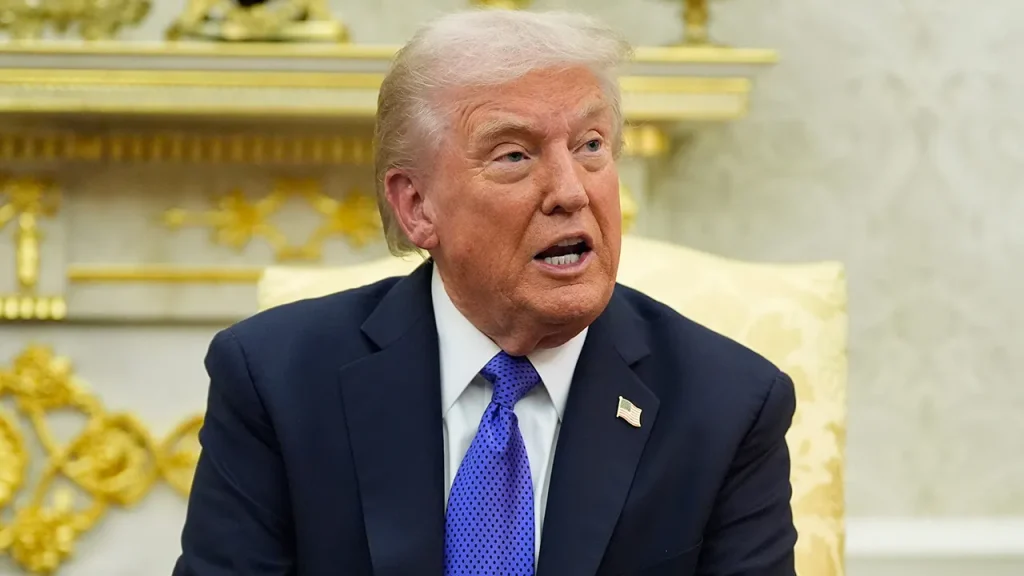Listen to the article
President Donald Trump has called on Senate Republicans to dismantle the Affordable Care Act, commonly known as Obamacare, proposing instead that federal healthcare funds be distributed directly to American citizens.
In a Saturday morning post on his social media platform Truth Social, Trump outlined his vision for healthcare reform, arguing that the current system funnels excessive funding to insurance companies while delivering substandard care to Americans.
“I am recommending to Senate Republicans that the Hundreds of Billions of Dollars currently being sent to money sucking Insurance Companies in order to save the bad Healthcare provided by ObamaCare, BE SENT DIRECTLY TO THE PEOPLE SO THAT THEY CAN PURCHASE THEIR OWN, MUCH BETTER, HEALTHCARE, and have money left over,” Trump wrote.
The former president further criticized the current healthcare framework, describing Obamacare as “the worst Healthcare anywhere in the World” and suggesting that redirecting funds from “BIG, BAD Insurance Companies” to individuals would produce better outcomes. Trump also added an unrelated call to “terminate the Filibuster,” the Senate procedural rule that requires 60 votes to advance most legislation.
Trump’s renewed attack on the Affordable Care Act represents a continuation of his longstanding opposition to President Barack Obama’s signature healthcare legislation. During his first term, Trump and congressional Republicans attempted to repeal and replace the ACA but were ultimately unsuccessful when late Senator John McCain cast the decisive vote against the “skinny repeal” bill in 2017.
Healthcare policy experts note that Trump’s latest proposal lacks specific details on implementation. The current ACA structure includes premium subsidies for qualifying individuals purchasing insurance on government exchanges, Medicaid expansion in participating states, protections for those with pre-existing conditions, and requirements that insurers cover essential health benefits.
Critics of Trump’s approach suggest that simply redirecting funds to individuals without maintaining the regulatory framework of the ACA could leave millions without coverage and potentially drive up costs for those with pre-existing conditions or complex health needs.
Meanwhile, supporters of market-based healthcare reform have long advocated for more consumer choice and less government involvement, arguing that direct subsidies to individuals could foster competition and drive down costs.
The timing of Trump’s healthcare proposal comes as Republicans maintain a narrow majority in the House of Representatives and have regained control of the Senate following the 2024 elections. However, any major healthcare overhaul would likely face significant legislative hurdles.
Since its implementation in 2010, the Affordable Care Act has survived multiple legal challenges, including several that reached the Supreme Court. The law has expanded coverage to millions of previously uninsured Americans, though critics continue to point to rising premiums and deductibles in many markets.
Health policy remains a contentious partisan issue, with Democrats generally supporting the ACA framework while advocating for expansions and improvements, and Republicans frequently calling for market-based alternatives with less federal involvement.
The healthcare industry, representing approximately one-fifth of the U.S. economy, would face substantial disruption from any major policy shift. Insurance companies, hospital systems, pharmaceutical manufacturers, and medical device makers all have significant stakes in how healthcare is financed and delivered.
As this story develops, lawmakers and industry stakeholders will likely weigh in on the feasibility and potential impacts of Trump’s proposal on the American healthcare system and the millions who depend on it.
Fact Checker
Verify the accuracy of this article using The Disinformation Commission analysis and real-time sources.




9 Comments
Curious to hear more about the specifics of Trump’s proposal and how it would impact coverage, costs, and overall healthcare outcomes for Americans. Sounds like an interesting idea, but details matter a lot in this complex domain.
Direct payments to citizens could give them more choice and control over their healthcare, but I’m skeptical it would produce better outcomes overall without a comprehensive reform plan. Need to weigh pros and cons carefully.
Interesting proposal to redirect funds from insurance companies to individuals for healthcare. Wonder how that would impact coverage and costs for Americans. Curious to see the details and potential implications.
Dismantling the current healthcare system is a bold move. I can see the potential benefits of more direct payments, but concerned about unintended consequences and disruption to millions relying on the ACA. Requires careful consideration.
Curious to hear more details on Trump’s proposal to redirect Obamacare funds. Seems like it could provide more flexibility for consumers, but wonder about impact on insurance markets and overall healthcare access and affordability.
Trump is right that the current healthcare system has major issues, but I’m skeptical his proposed solution of direct payments would fix the underlying problems. Needs a more comprehensive, well-thought-out reform plan.
Direct payments to citizens could give them more control, but I worry it would further fragment the insurance market and lead to higher costs for those with pre-existing conditions or other high-risk factors. Requires careful analysis.
Redirecting funds from insurance companies to individuals is an interesting idea, but healthcare is incredibly complex. Would need to see specifics on how that would work in practice and what the broader implications would be.
Agreed, the devil is in the details when it comes to healthcare reform. Any major changes require very careful analysis to avoid unintended consequences.